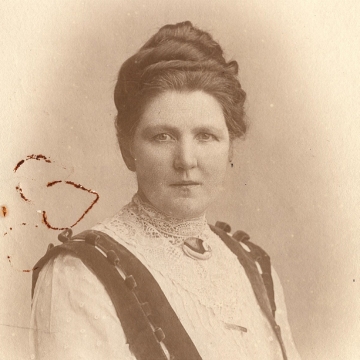Selina Cooper
The full resource is FREE to all registered users of the website
If you are not already registered you can sign up for FREE website access to download the full resource.

- Born: 1864
- Died: 1946
- Occupation: Mill worker and magistrate, suffrage campaigner
- Claim to fame: Selina was a prominent working class campaigner in the women’s suffrage movement, particularly through her involvement with textile workers. She was later sponsored by Women Against War and Fascism in 1934 to visit Germany and report on the treatment of women prisoners under the Nazi regime.
Early years
Selina Cooper was born in Cornwall but, after her father’s early death, the family relocated to find work in the cotton mills in Lancashire. Aged only 11 years, Selina began work in the local mill, spending half of the day there and the other half at school. By age 13, she left school to work full time in the mills; she also become interested in socialist politics.
Suffragist activities
In 1896, Selina founded a local branch of the Women’s Cooperative Guild, which gave women a voice within their workplaces and communities, and space to discuss wider politics, including suffrage. In 1900, Selina became involved with the North of England Society for Women’s Suffrage (NESWS), which was led by Esther Roper and Eva Gore-Booth, and included Emmeline and Christabel Pankhurst. Selina helped the NESWS organise and collect signatures for a petition to Parliament from Lancashire and from other cotton workers, and took it down to London in March 1901 with 14 fellow suffragists. From the total of 29,359 signatures, 29,197 of them were collected in Lancashire, 800 by Selina herself. She also accompanied a delegation of suffragist textile workers to the prime minister in 1906.
She became a full-time organiser of the NUWSS in 1907 and travelled the country, spending time away from home; this was appreciated by the NUWSS in London, who paid for a housekeeper to take care of Selina’s daughter when she was away. Selina also helped to persuade the society to start a joint Labour–NUWSS scheme in 1912, called the Election Fighting Fund (EFF), which sought to get Labour MPs elected to Parliament to further the women’s suffrage cause. She continued to work with the NUWSS throughout the First World War, during which time she and her husband supported the pacifist cause.
In 1913, Selina wrote, ‘One reason why I am a convinced suffragist, is that the mothers (even as wage earners) take the greater share of the responsibility in the upbringing of their children; therefore, they ought to have the greater means, not the less, to enable them to do justice to the rising generation.’ Throughout her life, Selina remained a passionate defender of working-class women’s and family rights, becoming a magistrate in 1924.
Glossary
- Socialist – a person who believes in the principles of socialism. Socialism is a political belief in ownership by the people (rather than private ownership) of production and services.
- Women’s Co-operative Guild – The Co-operative Guilds were organisations of working people who joined together to provide goods and services to working communities at a fair price. The Women’s Co-operative Guild was founded in 1883 to represent women in the movement. It supported women’s suffrage and argued that women should have full equal rights with men.
- Pacifist – a person who believes in the principles of pacifism. Pacifism is the belief that war is wrong, and, therefore, that to fight in a war is wrong.
Questions
- Why did families often move when one of the parents died?
- Why were Selina’s working-class credentials important to the NUWSS?
- What does Selina’s story tell us about the backgrounds of the suffrage campaigners?
